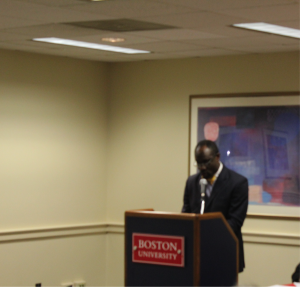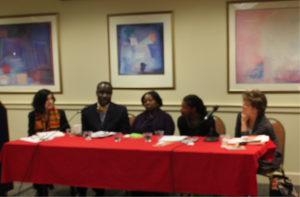In the GSU’s Terrance Lounge, the West African Research Association held a panel questioning blacks and the U.S. judicial system this past Wednesday night. The discussion, titled “Mass Incarceration: Africans and African Americans in the U.S. Criminal Justice System,” focused on the high rate of imprisonment of African and Caribbean immigrants.

Jennifer Yanco of the WARA lead the conversation, and Rev. George Walters-Sleyon, the founder and executive director of the Center for Church and Prison, an organization focused on community revitalization through prison reform, was the night’s featured presenter.
Although audience attendance was light, the discussion was not. The reverend’s presentation included his personal connection to the subject. As an immigrant from Liberia, he was arrested by border control under false pretenses in 2007. While in a federal prison for five days, he met other men in similar situations, which peaked his interest in the subject.
While the rate of African-American imprisonment is a known subject, the imprisonment of black immigrants is largely uncharted territory, which is a great detriment to society. Today, of the close to 800,000 blacks in U.S. prisons, around 80-85% are from Africa and the Caribbean. Within this theme, knowledge is also a prevalent issue because people are unable to figure out why they are being deported or arrested because the facts don’t add up.
The panel, which included Ann Medinus, Trina Jackson and Lesley Walker, agreed with the Reverend. In addition, they also brought up the many difficulties that these people face upon release, including difficulties finding jobs when they have a record and why the community is the root of a solution.

Medinus, the executive director of the African Community Health Initiative, brought up several anecdotes of individuals that she had met through her work who fell prey to this predicament.
“These people will fall prey to the stigma of someone who has been incarcerated,“ she said. “It become so much harder for them to get a job and better themselves, just because of this.”
In addition, Jackson brought up the need for dialogue between both the black immigrant community and the African-American community. A community activist and organizer for the Network of Immigrant and African Americans in Solidarity, Jackson has made it a point in her work to work on the tensions between African-Americans and Caribbean immigrants.
“As a community, we need to build solidarity,” she said.
Altogether the conversation was thought provoking and left audience members with a lot to think about. Dr. Alexander Zito, a West African Language lecturer at B.U., loved the conversation because it explained the topic through economic and social terms. “When all of these things come together, under the rubric of systematic racism, and look at in in a multi-dimensional way, it becomes really clear,” Zito said.
To find out more information, go to the Center for Church and Prison website at www.churchandprison.org.

